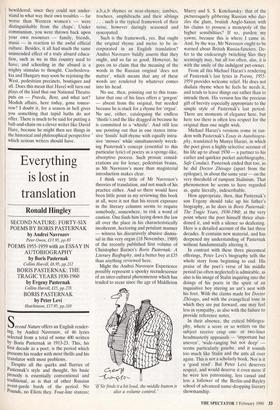Everything is lost in translation
Ronald Hingley
SECOND NATURE: FORTY-SIX POEMS BY BORIS PASTERNAK by Andrei Navrozov
Peter Owen, £13.95, pp.83
POEMS 1955-1959 with an ESSAY IN AUTOBIOGRAPHY by Boris Pasternak
Collins Harvill, £6.95, pp.2I2
BORIS PASTERNAK: THE TRAGIC YEARS 1930-1960 by Evgeny Pasternak
Collins Harvill, £15, pp.278
BORIS PASTERNAK by Peter Levi
Hutchinson, £17.95, pp.310
S. econd Nature offers an English render- ing, by Andrei Navrozov, of 46 lyrics selected from a total of some 400 written by Boris Pasternak in 1913-23. This, his first decade as a poet, is the period which presents his reader with most thrills and his translator with most problems.
Despite all the quirks and flurries of Pasternak's style and thought, his basic Prosody is essentially conventional and traditional, as is that of other Russian avant-garde bards of the period. No Pounds, no Eliots they. Four-line stanzas; a,b,a,b rhymes or near-rhymes; iambics, trochees, amphibrachs and their siblings . . . such is the typical framework of their verse, however daringly seasoned and syncopated.
Such is the framework, yes. But ought the original rhyme and metre to be in- corporated in an English translation? Andrei Navrozov baldly asserts that they ought, and so far so good. However, he goes on to claim that the meaning of the words in the Russian original 'does not matter', which means that any of these words are rendered by whatever comes into his head.
No use, then, pointing out to this trans- lator that one of his lines offers a `gorgon' — absent from the original, but needed because he is stuck for a rhyme for 'organ'. No use, either, cataloguing the endless 'thistle's and the like dragged in because he is committed to a 'whistle'. And still less use pointing out that in one stanza intru- sive 'fossils' half-rhyme with equally intru- sive 'mosses' while simultaneously wreck- ing Pasternak's concept (essential to this particular lyric) of poetry as a sponge-like, absorptive process. Such prosaic consid- erations are for lesser, pedestrian brains, as Mr Navrozov's more than magisterial introduction makes clear.
I think very little of Mr Navrozov's theories of translation, and not much of his practice either. And so there would have been little point in my reviewing this book at all, were it not that his recent exposure in the literary columns seems to require somebody, somewhere, to risk a word of caution. One finds him laying down the law all over the place in his characteristically incoherent, hectoring and petulant manner — witness his discursively abusive dismis- sal in this very organ (18 November, 1989) of the recently published first volume of Christopher Barnes's Boris Pasternak: A Literary Biofraphy, and a better buy at £35 than anything reviewed here.
Might the Andrei Navrozov Experience possibly represent a spooky recrudescence of an inter-cultural phenomenon which has tended to recur since the age of Middleton 'If Sir finds it a bit loud, the middle button is also a volume control,' Murry and S. S. Koteliansky: that of the picturesquely gibbering Russian who daz- zles the glum, brutish Anglo-Saxon with his claims to possess a monopoly of the higher sensibilities? If so, pardon my yawns, because this is where I came in. And, by the way, Mr Navrozov ought to be warned about British Russia-fanciers. De- fer to the endearingly twitching Slav they seemingly may, but all too often, alas, it is with the smile of the indulgent pet-owner.
From all this Michael Harari's rendering of Pasternak's last lyrics in Poems, 1955- 1959 provides welcome relief. He does not disdain rhyme when he feels he needs it, and tends to leave things out rather than to intrude them. His version has the precious gift of brevity especially appropriate to the simple style of Pasternak's last period. There are moments of elegance here, but here too there is often less respect for the original than one might wish.
Michael I bran's versions come in tan- dem with Pasternak's Essay in Autobiogra- phy, translated by Manya Harari, in which the poet gives a highly selective account of his life up to about 1930 — a partner to his earlier and quirkier pocket autobiography, Safe Conduct. Pasternak ended that too, as he did Doctor Zhivago (apart from the epilogue), in about the same year — on the very threshold of rampant Stalinism. That phenomenon he seems to have regarded as, quite literally, indescribable.
How appropriate, then, that Pasternak's son Evgeny should take up his father's biography, as he does in Boris Pasternak: The Tragic Years, 1930-1960, at the very point where the poet himself thrice aban- doned it, and with a silence so deafening. Here is a detailed account of the last three decades. It contains new material, and has deepened my understanding of Pasternak without fundamentally altering it.
In contrast with these three piecemeal offerings, Peter Levi's biography tells the whole story from beginning to end. His praise of the poet's verse of his middle period (so often neglected) is admirable, as also is his image of Stalin inquiring into the doings of his poets in the spirit of an inquisitive boy stirring an ant's nest with his foot. With the claims made for Doctor Zhivago, and with the evangelical tone in which they are put forward, one may feel less in sympathy, as also with the failure to provide reference notes.
In their absence, the critical bibliogra- phy, where a score or so writers on the subject receive crisp one- or two-liner headmasterly appraisals — 'important but uneven', 'wide-ranging but not deep' — seems particularly gauche, and it sounds too much like Stalin and the ants all over again. This is not a scholarly book. Nor is it a 'good read'. But Peter Levi deserves respect, and would deserve it even more if he were less patronising, less casual and less a follower of the Berlin-and-Bayley school of advanced name-dropping literary showmanship.


















































 Previous page
Previous page